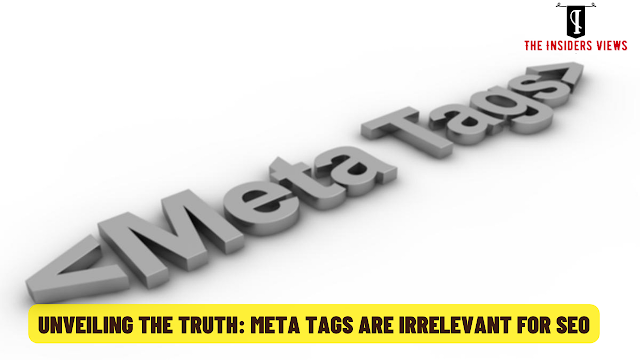Unveiling the Truth: Meta Tags are Irrelevant for SEO
Are you still spending hours meticulously crafting meta tags for your website in hopes of boosting your SEO rankings? Well, it's time to let go of that outdated practice. Contrary to popular belief, meta tags no longer hold significant weight in search engine optimization. In this article, we will delve into the truth behind this long-standing myth and explore why meta tags have become irrelevant in the ever-evolving world of SEO.
 |
| Unveiling the Truth: Meta Tags are Irrelevant for SEO |
Unveiling the Truth: Meta Tags are Irrelevant for SEO
In the past, meta tags played a crucial role in determining a website's ranking on search engine results pages (SERPs). However, search engines have evolved significantly, and their algorithms have become more sophisticated over time. As a result, meta tags have lost their once mighty influence on SEO. Let's uncover the reasons behind this shift.
The Changing Landscape of Search Engines
With advancements in technology, search engines have become smarter and more intuitive. They now rely on complex algorithms that take into account a multitude of factors when determining website rankings. Meta tags alone cannot provide enough information for search engines to accurately evaluate and rank a website.
Keyword Relevance and User Intent
In the early days of SEO, meta tags were primarily used to include relevant keywords in a webpage's code. However, search engines now prioritize understanding user intent and delivering the most relevant results. Keywords in meta tags no longer carry the same weight as they once did. Search engines now analyze the actual content of the webpage to determine its relevance to a user's query.
Content is King
The phrase "content is king" has become a cornerstone in modern SEO practices. Search engines place a premium on high-quality, informative, and engaging content. While meta tags can provide a brief summary of a webpage's content, they pale in comparison to the comprehensive information that can be gleaned from the actual text on the page.
User Experience and Engagement
Search engines have shifted their focus to providing the best possible user experience. Factors such as page loading speed, mobile-friendliness, and user engagement metrics now play a crucial role in determining a website's ranking. Meta tags do not contribute to these aspects of SEO, rendering them ineffective in improving a website's visibility.
Misuse and Spamming
In the past, unscrupulous website owners abused meta tags by stuffing them with irrelevant keywords or misleading information. This led to a decline in their relevance as search engines adapted and became more discerning. To combat spammy practices, search engines now rely on more reliable signals, such as backlinks and social media mentions, to determine a website's authority and credibility.
FAQs About Meta Tags and SEO
Q: Are meta tags completely useless for SEO?
A: While meta tags may not directly impact SEO rankings, they still serve a purpose. They can enhance the appearance of a webpage on search engine result pages, potentially attracting more clicks from users.
Q: Should I stop using meta tags altogether?
A: No, it is still good practice to include meta tags on your website. Although they may not significantly affect SEO, they can improve the user experience by providing concise information about a webpage's content.
Q: Are there any meta tags that still matter for SEO?
A: Yes, certain meta tags, such as the meta description and Open Graph tags, can influence how your webpage appears in search engine results and social media platforms. They can indirectly impact click-through rates and user engagement.
Q: If meta tags don't matter, what should I focus on for SEO?
A: Instead of obsessing over meta tags, shift your focus to other essential aspects of SEO. Pay attention to creating high-quality and relevant content, optimizing your website's structure and navigation, building authoritative backlinks, and improving user experience.
Q: Can meta tags still influence my website's visibility in any way?
A: While meta tags may not directly impact rankings, they can indirectly affect your website's visibility. A well-crafted meta description, for example, can entice users to click on your link in the search results, potentially improving click-through rates and organic traffic.
Conclusion
In conclusion, it's time to debunk the myth that meta tags hold significant weight in SEO. The truth is, search engines have evolved, and their algorithms now rely on a multitude of factors to determine rankings. While meta tags may still serve a purpose in providing concise information and enhancing the appearance of your web pages, they no longer hold the power they once did in influencing SEO rankings. To achieve success in SEO, it is crucial to focus on creating high-quality content, optimizing website structure, and providing an exceptional user experience.
Remember, staying up to date with the latest SEO trends and best practices is vital to ensure your website remains visible and competitive in the online landscape.





Post a Comment